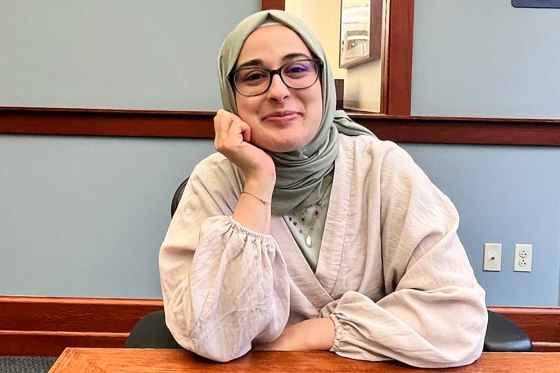The federal government is fighting a judge’s ruling that Tufts University student Rümeysa Öztürk, who wrote an essay about Israel and the war in Gaza and is fighting deportation, must be transferred back to an immigration facility in Vermont from Louisiana.
The Justice Department filed an appeal of the judge's order on Tuesday and asked U.S. District Judge William K. Sessions III to pause Öztürk's transfer while it appeals.
Sessions ruled Friday that Öztürk, who is being held in Immigration and Customs Enforcement custody in Louisiana, must be transferred to Vermont, where her habeas corpus petition was filed.
She would be allowed to remain there as the petition, which challenges her detainment, plays out in court. Her deportation case in immigration court in Louisiana would also proceed while she is detained in Vermont.
On Wednesday, Öztürk's attorneys opposed the government's request to pause the judge's order pending appeal.
"Only one party—Ms. Öztürk—would suffer anyharm from a stay, and that harm is irreparable," her attorneys wrote in a court filing. "By contrast, the government suffers no harm at all by holding Ms. Öztürk in detention in Vermont instead of Louisiana and being compelled to justify her continued detention.”
Department of Homeland Security agents grabbed Öztürk, a doctoral student who was in the United States on a student visa, off the street in late March. DHS accused her of engaging “in activities in support of Hamas.”
Last year, Öztürk co-wrote an op-ed in the Tufts student newspaper that called on the school to “acknowledge the Palestinian genocide” and divest from companies with ties to Israel. The school said in a statement that the essay did not violate its policies.
Öztürk was moved to three separate locations, including Vermont, before she ended up in Louisiana, despite an order from a district court that said she could not be moved out of Massachusetts without notice.
“For nearly 24 hours, Ms. Öztürk’s attorney was unable to locate her,” the American Civil Liberties Union, which is representing her in part, said in a news release. “More than 16 hours after a federal court ordered that Ms. Öztürk not be moved out of Massachusetts in order to ‘preserve the status quo,’ her counsel was kept in the dark about Ms. Öztürk’s whereabouts.”
Court documents show that ICE officials said she was transferred there because “there was no available bedspace” in the New England facilities.
Immigration advocates and experts say that facilities in rural Louisiana have been the subject of major human rights criticisms and that the Trump administration has sent students to a jurisdiction that is aligned with its immigration goals.
The detentions of Öztürk and other student activists across the country have prompted widespread criticism of the federal government and its role in protecting free speech.
On Tuesday, a congressional delegation led by Rep. Troy Carter, D-La., visited the ICE facilities in Louisiana. The members met with Öztürk and Columbia University student Mahmoud Khalil, a pro-Palestinian activist and green-card holder, whom ICE arrested and detained in early March.
Öztürk and Khalil are among the hundreds of international students whose visas the Trump administration has revoked as it takes aim at scholars who participate in political activism, among other factors.
“It might be more than 300 at this point. We do it every day. Every time I find one of these lunatics, I take away their visas,” Secretary of State Marco Rubio said at a news conference last month.

